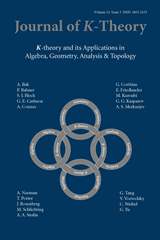Crossref Citations
This article has been cited by the following publications. This list is generated based on data provided by Crossref.
Akita, Toshiyuki
and
Liu, Ye
2018.
Second mod 2 homology of Artin
groups.
Algebraic & Geometric Topology,
Vol. 18,
Issue. 1,
p.
547.
Antolín, Yago
and
Flores, Ramón
2023.
Bredon homology of Artin groups of dihedral type.
Journal of Pure and Applied Algebra,
Vol. 227,
Issue. 11,
p.
107376.
Antolín, Yago
Blufstein, Martín
and
Paris, Luis
2025.
When is a TRAAG orderable?.
Communications in Algebra,
Vol. 53,
Issue. 8,
p.
3550.


